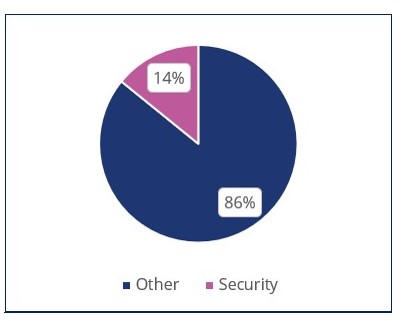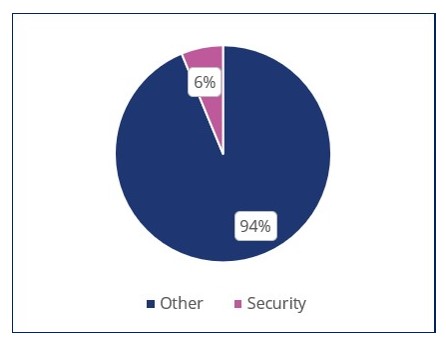Improving security welfare sees reduction in incidents
An annual review of Safety Health Wellbeing and Environment (SHWE) by the Enabling Works Contracts in Area South identified a disproportionate number of incidents involving security guards. A subsequent investigation found that security guards were not considered to be construction workers and were perceived as low risk. They were treated differently to other members of the workforce, without the same care and attention for their safety, health and wellbeing. In particular they were found to have inadequate welfare facilities and a lack of briefings and supervision. Subsequent improvements were introduced including improved welfare facilities, improved permanent lighting, trained supervisors and start on site briefings, which led to a significant reduction in security guard-related incidents and improved their wellbeing.
Background and industry context
The Enabling Works Contract (EWC) on the southern section of High Speed Two (HS2) phase one includes demolition of buildings within the wider Euston area, utility diversions, environmental and ecological monitoring and a programme of historic environment and archaeological activities, delivered by the Costain Skansja joint venture (CSjv).
In 2019, there were 92 reported incidents on the Enabling Works Contract (EWC) Area South. An investigation led to the discovery that 14% of these were related to security guards.

The investigation concluded that security staff were not considered to be construction workers and were perceived as low risk. They were treated differently to other members of the workforce, without the same care and attention for their safety, health and wellbeing. When this working environment changed, the outcomes improved.
Three key contributing factors were identified as deficiencies relating to incidents that impacted security guards:
Inadequate Welfare Facilities
The temporary welfare facilities provided for security staff were not adequate for use over extensive periods of time. The security guards were exposed to the elements and when this became unbearable, they would eventually make extended journeys on foot to a better-quality welfare area.
Examples of welfare issues included toilets not working which required flushing with bottled water, poor lighting, welfare that was not cleaned regularly, lack of water dispensers and no facilities for washing-up.
Lack of briefings
The work of security guards was perceived as low risk, and as a result, they were not seen as part of the construction workforce. Consequently, they did not receive the same briefings, or the same health and safety engagement as other construction workers.
Lack of supervision
As a result of security staff not being considered as part of the construction workforce, they did not have the same level of supervision as other operatives. They were not working under the supervision of competent ‘black-hat’ frontline supervisors (FLS).
Lessons learned and successes
As a result of the investigation’s findings, the following improvements were implemented:
- Welfare issues were rectified, particularly where staff were stationed at remote outposts. The team deployed more semi-permanent installations rather than relying on portable units, and the welfare was ensured to be kept clean and well maintained.
- All security patrol routes were assessed and made safe where needed. Permanent lighting was also installed to improve visibility at night along patrol routes as standard, rather than relying on temporary tower lights.
- Security supervisors were upskilled and were trained under the Site Management Safety Training Scheme (SMSTS)[1]. This helped develop their understanding of what they were securing and some of the risks around a construction site. Security supervisors were also included in the programme’s FLS assessment process.
- The security team implemented a Start-of-Shift (SOS) briefing and cascade that was specifically produced for security staff for all sites and delivered by a security FLS. This was key to engaging with security guards, making them feel part of the team and making them aware of some of the specific risks and controls on their sites. All guards were briefed regularly on safe patrol routes and the specific hazards to be aware of – these could change daily, especially within a busy construction site.
These measures were all underpinned by regularly inspecting and monitoring the improvements, which was a combined effort from both the CSJV and supply chain management teams, with the output being reviewed regularly.
As a result of the improvement measures implemented in 2020, there was a huge reduction in total incident statistics, with only 2 out of 32 incidents being security related. When the hours worked over the two years were normalised and the data extrapolated, the improvement measures reduced the number of incidents involving security staff by 10.
The overall result of this safety intervention has improved wellbeing of the security guards, improved morale and reduced the number of slip, trip and fall incidents by 75%.

Recommendations
Security staff should be treated the same as other operatives in the workforce. They are subjected to many of the same environments that impact on their safety, health and wellbeing.
All security staff should have an SOS briefing before their shift, have the right levels of supervision and have access to appropriate welfare facilities.

Acknowledgements
The authors wish to thank all those who have contributed to the successful implementation of CSJV’s risk management process:
- Servest Security Team
- CSJV Work Package Managers
- CSJV Frontline Supervisors
- CSJV Safety, Health, Wellbeing and Environment (SHWE) Team.
